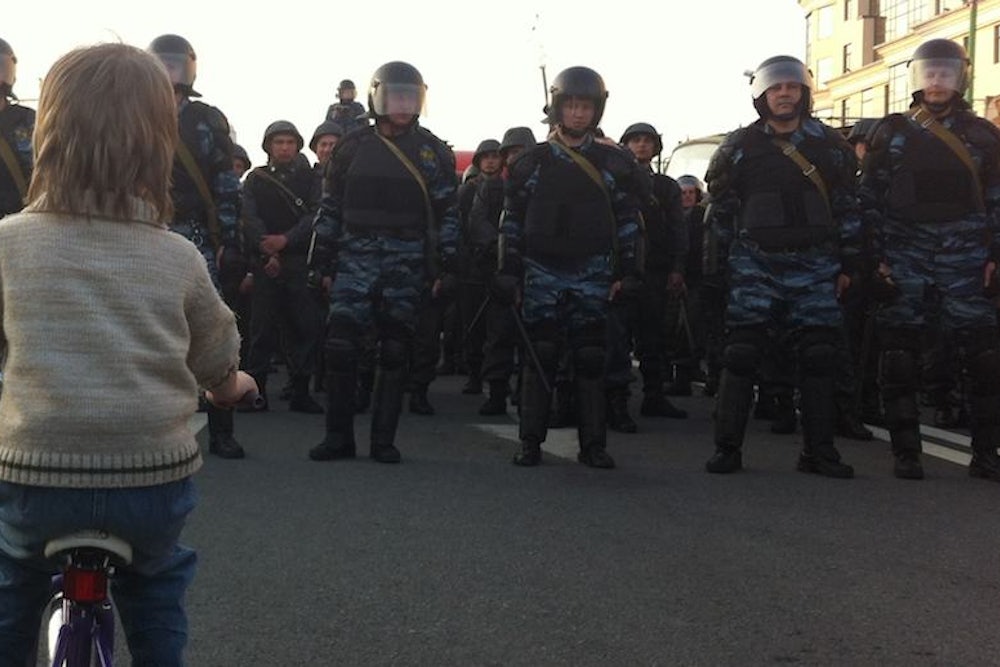Monday’s rally in Moscow started with a moment of silence to commemorate the event, exactly one year ago, that sowed the seed of the protest movement’s demise.
Last year, on May 6, the day before Vladimir Putin was inaugurated president of the Russian Federation for the third time, tens of thousands of people marched peacefully down a wide Moscow avenue to Bolotnaya Square, an act that itself commemorated the first mass protest against Putin’s government on December 10, 2011. It was a heady time: People were angry and fed up with the government’s increasingly ham-fisted lies, and they were giddy at the discovery that there were tens of thousands of people in an atomized, sprawling city who were just like them, a fact that the Russian media had done its best to keep from anyone.
But then—either because of a planning glitch, or, more likely, a police provocation—the May 6 protest devolved into chaos. Police and protestors clashed violently in the square, and the violence spread throughout the city as the protestors scattered, and police pincered them out of subways and cafes. It was a violent, horrifying day, made all the more so by the unexpectedness of the conflagration.
In the following year, the protest movement sank into a kind of aimless despair as the state systematically arrested 28 people it deemed had disturbed the peace. One, Maria Baronova, a young mother, faces two years in prison for a YouTube video showing her encouraging protesters. One young man faces a lengthy jail term for exhorting people to violence, even though he has a debilitating stutter. Others face years in prison for hitting police officers, when they were the ones injured. The dragnet even caught an old woman, a pensioner. (There were, of course, no investigations into possible police brutality; all the injured special ops fighters who suffered bruises and bloody noses were rewarded with free apartments.)
Monday’s rally was nominally to show support for these people, the so-called Prisoners of Bolotnaya, whom the government has clearly made an example of: You want to protest, be prepared for the consequences. But in reality, today’s protest was a sort of test for signs of life. Did anything remain of that thrilling, optimistic protest movement of yesteryear?
The answer? A definitive, depressing maybe. As usual, more people came than the pessimistic projections predicted: anywhere from 8,000 (police estimate) to 30,000 (organizers). By all accounts, the hopelessness was dissipated a bit by anger, but the aimlessness of it all was still there. “It was a lot of people,” tweeted Moscow Guardian correspondent Miriam Elder. “And they know what they want. But they—and the opposition leaders—still dunno how to get there…” This was reflected in the tired, usual-suspects line-up of speakers, and their staid, regurgitated speechifying. It was made all the more pathetic by the weak sound system: A mishap earlier in the day had killed a volunteer setting up the equipment, and speeches had to be delivered from the side of a truck rigged up as a stage. Sometimes, it reverted into farce, as when opposition journalist Oleg Kashin went dada and sang, a capella, a song called “It’s All Going According to Plan.” Some invoked the Stalinist purges of 1937—a common, if slightly inappropriate trope of late. Boris Nemtsov, a former deputy prime minister under Yeltsin and an opposition veteran, declared, “No more resolutions! This time, we have demands!” It was a cringeworthy, unwittingly Monty Python-esque moment, and it reflected the impotence of the large, angry crowd. It was the age-old Russian dilemma, incarnate: What is to be done?
Elder told me that everyone she spoke to came to the rally “because we couldn’t not come.” She said it reminded her of the people who vote for Putin “because there’s no one else to vote for.” “It’s all so passive,” she noted. I would argue that the passiveness is the impotence of defeat, when, as the Russian saying goes, your hands fall to your sides because you just don’t see what can be done. Because if the government ignores you and doesn’t give an inch—the best the Kremlin could do today was simply to say that Putin is “aware” of everything going on; aware, and nothing but—there’s not much you can do. And if it pushes and intimidates, it makes sense to do what many Muscovites do: retreat into your vacations to Goa and your Apple products, into a cozy cocoon of friends and family, hidden from the brutality outside. Or you could do what an unverifiable number of Russians are doing: leaving. But it’s a hard decision to make. “I have no other country, I have nowhere to retreat,” boomed opposition politician Alexey Navalny, the one rousing speaker today. It was a heartbreaking expression of what I’ve seen in many of my liberal Moscow friends: They are being slowly squeezed out of their country, being made to feel like foreigners in their own land.
After the live streams from Bolotnaya ended, I spent the afternoon watching videos from the fallout of last year’s May 6 violence: a peaceful, many-days-long sit-in at the statue of Abai Kunanbaev, a Kazakh poet, on one of Moscow’s old tree-lined boulevards. It was a wonderful, happy spring, the days sunny and long, full of hope and silliness, and people played guitars and sang old Polish Solidarity songs about toppling walls with their shoulders. A year later, it’s hard to watch. There is no one at the fountain today, and it’s not just because it’s unseasonably cold in Moscow.
